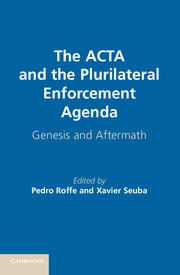Book contents
- Frontmatter
- Contents
- List of Contributors
- Foreword
- Acknowledgments
- Acronyms
- Introduction
- PART I THE FINAL ACT: ITS MAIN FEATURES AND CONTENTS
- 1 An Overview of the Agreement
- 2 ACTA Initial Provisions and General Definitions
- 3 ACTA General Obligations with Respect to Enforcement
- 4 Provisions on Civil Enforcement – Section 2 of ACTA
- 5 Legal Framework for Enforcement
- 6 ACTA and Beyond
- 7 ACTA’s Digital Chapter
- 8 The ACTA Committee
- PART II DOMESTIC LEGISLATIVE CHALLENGES
- PART III IMPACT ON RELATED PROCESSES
- PART IV VIEWS FROM STAKEHOLDERS: LESSONS
- PART V WHAT LIES AHEAD ACTA
- Annex I Anti-Counterfeiting Trade Agreement
- References
- Index
- References
8 - The ACTA Committee
Published online by Cambridge University Press: 05 December 2014
- Frontmatter
- Contents
- List of Contributors
- Foreword
- Acknowledgments
- Acronyms
- Introduction
- PART I THE FINAL ACT: ITS MAIN FEATURES AND CONTENTS
- 1 An Overview of the Agreement
- 2 ACTA Initial Provisions and General Definitions
- 3 ACTA General Obligations with Respect to Enforcement
- 4 Provisions on Civil Enforcement – Section 2 of ACTA
- 5 Legal Framework for Enforcement
- 6 ACTA and Beyond
- 7 ACTA’s Digital Chapter
- 8 The ACTA Committee
- PART II DOMESTIC LEGISLATIVE CHALLENGES
- PART III IMPACT ON RELATED PROCESSES
- PART IV VIEWS FROM STAKEHOLDERS: LESSONS
- PART V WHAT LIES AHEAD ACTA
- Annex I Anti-Counterfeiting Trade Agreement
- References
- Index
- References
Summary
Introduction
In discussing the Anti-Counterfeiting Trade Agreement (ACTA), most policymakers and commentators have focused on either the lack of transparency and accountability in the negotiation process or the problems raised by the TRIPS-plus standards included in the agreement. While these issues deserve our urgent attention, it is important not to ignore the institutional arrangements laid out in Chapter V of the agreement. In the long run, this chapter is likely to become the most far-reaching and dangerous of all the chapters in ACTA.
Behind only the chapter on substantive standards, Chapter V is the second-longest chapter in the agreement. Included in this chapter are provisions creating and governing a little institution called the “ACTA Committee.” On its face, those provisions are boring, mundane and highly administrative. In reality, they govern matters ranging from membership to amendments to rules and procedures. Those provisions also help institutionalise ACTA as a freestanding, self-evolving forum. As a result, they have the potential to determine the future development of not only ACTA but also the international intellectual property system.
This chapter explains why the ACTA Committee could become such a powerful institution. It begins by providing an overview of the provisions governing the Committee. It then explains how the ACTA Committee provides a freestanding, self-evolving architecture to facilitate the ratcheting up of international intellectual property standards. The chapter concludes with a discussion of the Committee’s ramii cations for both developing countries and the international intellectual property system.
- Type
- Chapter
- Information
- The ACTA and the Plurilateral Enforcement AgendaGenesis and Aftermath, pp. 143 - 154Publisher: Cambridge University PressPrint publication year: 2014



